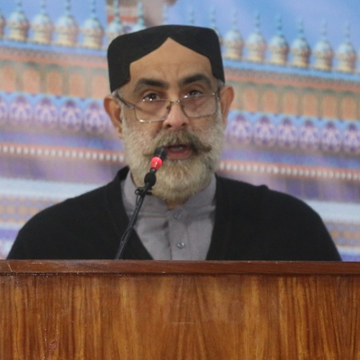
|
|
Sahibzada Muhammad Mehboob Sultan
Federal Minister for Ministry of States and Frontier Regions
Chief Guest Remarks
|
| |
The foundations of the society we live in have been laid by the sufis. They have played a vital role in raising the voice of truth in this region. Even in today's modern age, if our society is established, it is based on the moral and spiritual training provided by the sufis. H̱aḏrat Sultan Bahoo says
Wish to live like dead, then adopt lifestyle of Faqeers (Mystics) - Hoo,
If rubbish thrown at you then endure it - Hoo,
If someone abuses or shouts at you, be polite to him - Hoo,
Tolerate noise, taunts, insult and humiliation for the sake of Friend - Hoo,
The most powerful holds our reins Bahoo, live as He makes you live - Hoo.
|
Nurturing of soul and inner life teaches integrity and enables one to distinguish between truth and falsehood. This is the practical way that is the basis of Muslim civilization and societies. With such good morals and characters, sufis enlightened the hearts of millions of people with the light of faith. The Sufis followed in the footsteps of the prophets, so they gave great importance to local languages. Our cultural heritage is no less than any other nation or region in the world. We must be proud of our history and pass on our traditions and culture to the next generation.
|
|
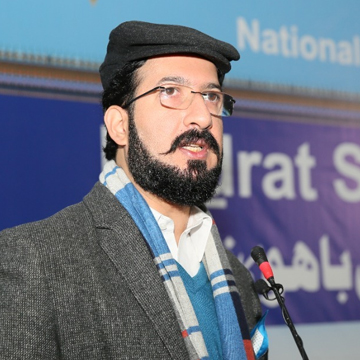
|
|
Sahibzada Sultan Ahmed Ali
Dewan of Junagadh and Chairman MUSLIM Institute
Remarks by the Chair
|
| |
|
I would like to give a piece of advice to all students that we should at least spend thirty minutes a day reading ten pages because a person reads one page in three minutes usually. According to this, we have seventy pages in a week. So, you can complete a book in a month. At the end of the year, just thirty minutes of hard work completes twelve books a year. If the books being read include the books of H̱aḏrat Sultan Bahoo or any other sufi saint, we can get linked with our history, culture and tradition. We have moved away from our culture because we have moved away from the books. We need to connect with our history, the glory of the past, and the curriculum of our ancestors.
|
|
|
|
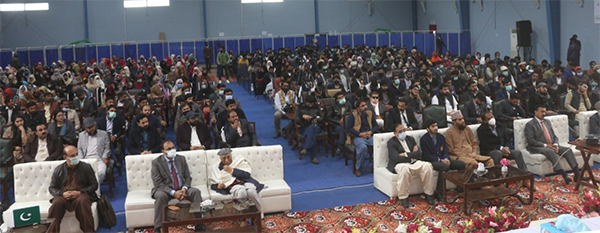
|
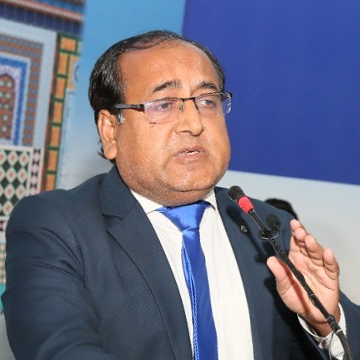
|
|
Prof. Dr. Abdul Qadir Mushtaq
Chairman Arts & Social Sciences GC University Faisalabad
Guest of Honour
|
| |
|
According to the teachings of H̱aḏrat Sultan Bahoo, a murshid (spiritual guide) is the one who always follows sharī‘at (Islamic laws) in letter and spirit, the practice of sharī‘at is reflected in his life and he spends life according to the t̲arīqat (spiritual path). He is acquainted with the secrets of ma‘rifat, (recognition of Allah Almighty) has access to the reality and makes it possible for the seeker to reach all these destinations. There are two kinds of fayḏ (spiritual guidance), one is nāsūti (related to mortal world) and the other is malakūti (related to the eternal world). We should choose the company of the murshid so that he can connect us with Allah Almighty. Our tragedy is that we wish for nāsūti fayḏ and miss the real spirit of mysticism. The role of saints belongs to malakūti fayḏ. As long as our forefathers continued to associate with the saints for malakūti fayḏ, tolerance, peace, love and attitudes of the people in the society were different from today.
|
|
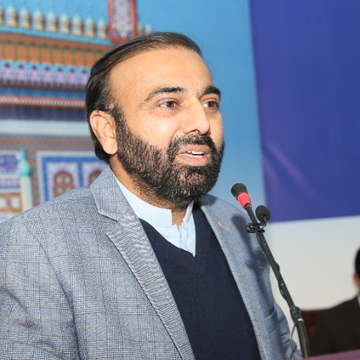
|
|
Prof. Dr. Ghulam Shams ur Rehman
Islamic Studies Department, GC University Faisalabad
Guest of Honour
|
| |
|
Today, there is a general perception about Muslim society, and especially in Pakistan, that these people are not progressive. This impression is rooted in the colonial system. In fact, this is the land that was called the Golden Sparrow wherein science, philosophy, mysticism, and other great poets were born. Soon after the political decline, the colonial system came into vogue and we lost our connection with the Persian language. Resultantly, we were completely separated from our culture. And unfortunately, to this day, we have not thought of an alternative. To this day, our nation has not been able to move beyond colonial thinking. In the present era, it needs to be mentioned that Hindus and Muslims lived together during 1000 years of Muslim rule. Similarly, Istanbul was the centre of both Christians and Muslims. This was the rule of Muslims. We need to revive our own culture. Similarly, the role of sufis like H̱aḏrat Sultan Bahoo contributed to a greater extent for reformation of societies in and around the subcontinent. He has written about 140 books that are full of wisdom and work as a guide for the seekers of truth. He narrates in his books that if someone wants to adopt the true way, the way of Allah Almighty, one has to immerse oneself in tawhid Rabbani (oneness of Allah Almighty).
|
|
|
|
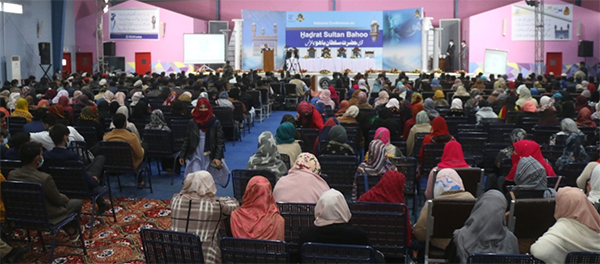
|
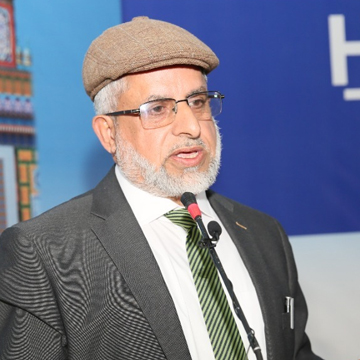
|
|
Mr. M. A. Khan
Translator of H̱aḏrat Sultan Bahoo’ Books, Luton Uk
Guest of Honour
|
| |
My topic is ‘thoughts can change the DNA’. H̱aḏrat Sultan Bahoo mentioned in his poem
|
Irrigated with water of negation and affirmation in whole body - Hoo,
|
When we start dhikr (remembrance) and have deep thoughts on it, we try to contemplate Ism-e-Allah Zaat (Actual name of Allah Almighty ﷻ) inscribed on our hearts. This heart is the spiritual heart which is mentioned in Holy Qur’ān as Al Fawad. It is a fact that the influence of thoughts is felt upon the DNA. When we breathe with Dhikr, it provides positive energy to our cells. DNA can only allow the cell membrane to open when it feels that the coming energy is positive. Therefore, we can understand the verse of H̱aḏrat Sultan Bahoo
|
“It has blossomed and emits sweet fragrance all within – Hoo”,
|
When we breathe with Dhikr it blossoms our body with positive energy. Grief is about the past and fear is when we think about the future. In doing so, we forget about our present. So, this Dhikr provides us contentment and keeps us in present. Dhikr also enables to tolerate one another in society.
|
|
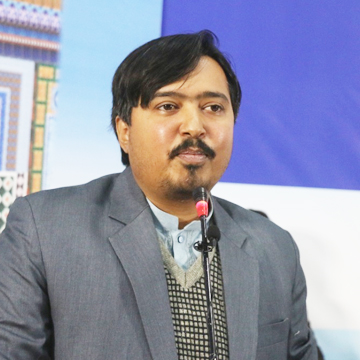
|
|
Dr. Usman Jamshed
Lecturer MNS, Agriculture University, Multan
Guest of Honour
|
| |
According to H̱aḏrat Sultan Bahoo, it is impossible to reach any destination in life without following the path of knowledge. One type of knowledge is Ilm-e-Ẓāhir (formal education which is taught in schools etc) and the other is Ilm-e-Bātin (knowledge of innermost). Sufis have a detailed discussion on Ilm-e-Ẓāhir and Ilm-e-Bātin, which is mentioned by H̱aḏrat Sultan Bahoo.
|
"He who tries to attain ‘Faqr’ without knowledge is an infidel, will die insane-Hoo,"
|
H̱aḏrat Sultan Bahoo in his Persian books has stated the fact of knowledge:
|
"Knowledge of truth is a bright light, there is no other light like it. Knowledge without practice is useless and it is like a burden loaded on a donkey”.
|
H̱aḏrat Sultan Bahoo has referred here primarily to Ilm-e-Bātin. It has a connection with the human soul because Ilm-e-Ẓāhir is not enough to address the challenges faced by humanity. This does not mean that he has denied the Ilm-e-Ẓāhir, but rather clarifies its reality and says:
There are two intellects, one intellect is ‘complete intellect’ (it is beyond reasoning and five senses) and the other is ‘partial intellect (human intellect which is based on reasoning and knowledge based on a matter relating to physical senses). Ilm-e-Bātin is required to achieve ‘complete intellect’.
|
| |
|
|
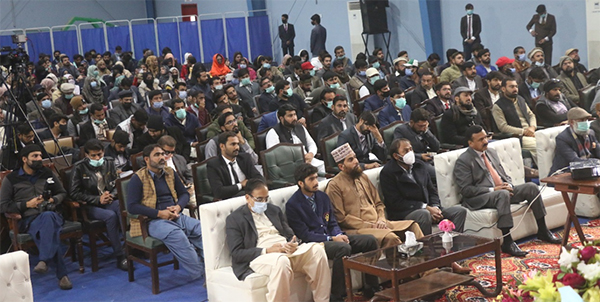
|
Q. What is the relationship of H̱aḏrat Sultan Bahoo with horses and other animals?
A. In the book, Conference of the Birds written by H̱aḏrat Farīd al-Dīn ʿAttār, he explained different aspects of life by taking examples of birds. Sufis deeply read about the birds and nature and explain different things about them. H̱aḏrat Sultan Bahoo defines various things of life by quoting horse, lion, birds, and falcon in his poetry.
Q. Is ‘ishq e majazi (worldly love) necessary for ‘ishq e ẖaqīqī (Ardent love of Allah)?
A. There is only one form of ‘ishq that is Ishq e ẖaqīqī. On the other hand, Allah Almighty ﷻ created this universe with love due to which creations love each other. However, some lust-oriented writers, replaced love with lust. There is a common phrase in western society that if you are beautiful then use it. In my opinion, the phrase is the humiliation of women. In tales, Sufis write stories for a purpose that contain deep meanings. For example, there are five elements in the stories of Sohni and Mahiwal. In reality, all five elements have different meanings. Sohni is a true love seeker (t̲ālib). Mahiwal is Beloved (mat̲lūb) sister-in-law is nafs (ego), pitcher is one that is half cooked for ‘ishq e ẖaqīqī, and the river is the world and its hardships. So, these stories are symbols for masses to reach ‘ishq e ẖaqīqī.
|
|
|
|
|
|
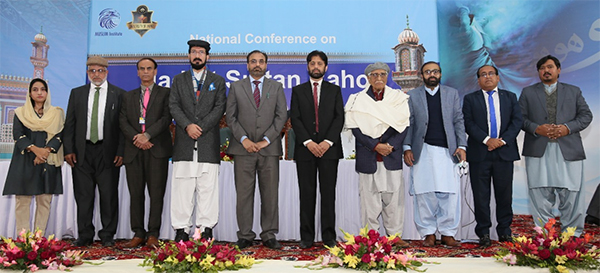
|
|
© 2022. All rights reserved.
|
|
|
|
|
|
|
| | | |